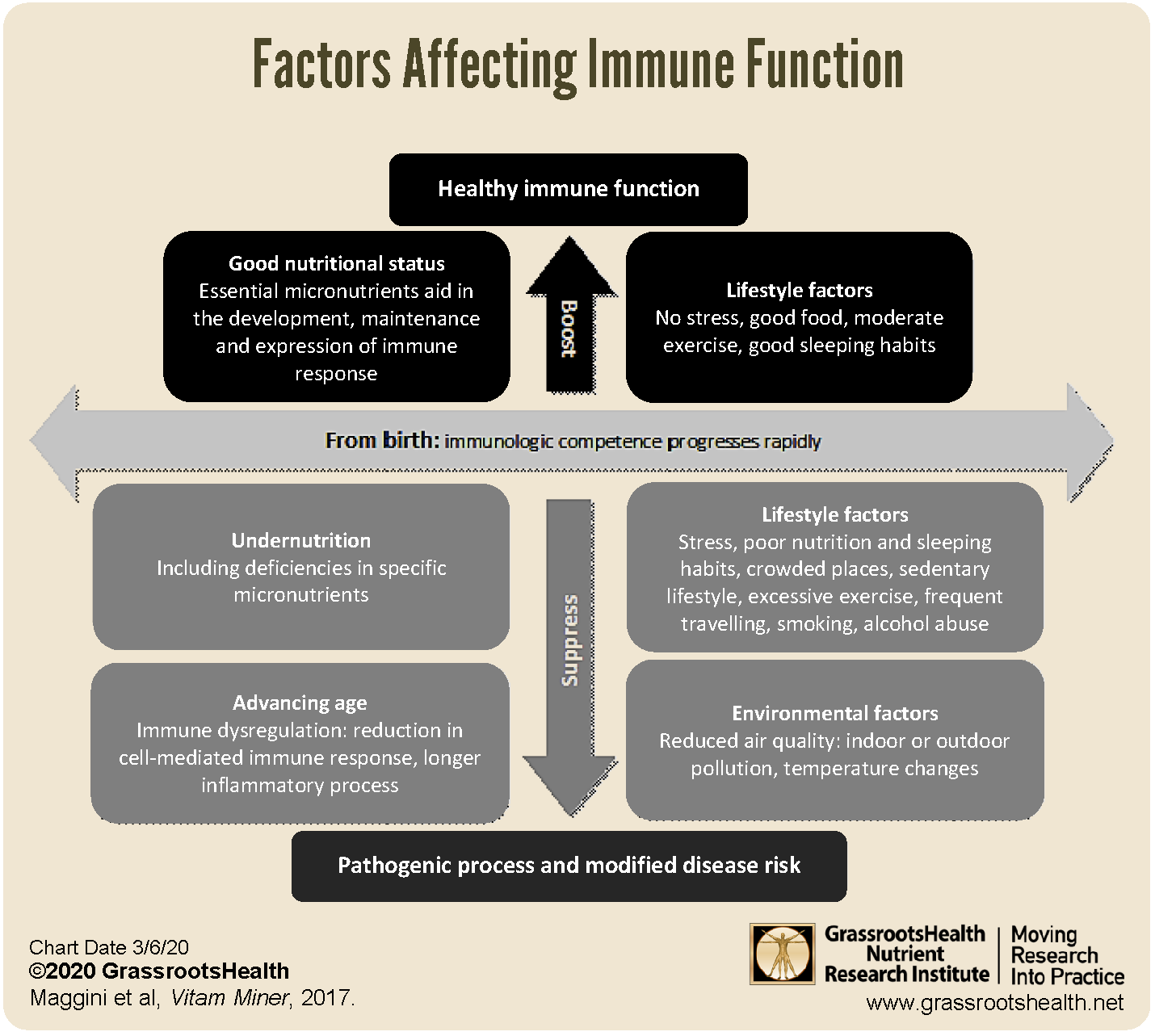Published on March 9, 2020
 In our last post, we covered the important roles of vitamin C, vitamin D and zinc within the immune system, and how deficiency of these nutrients affects the immune system response to an infection of the upper respiratory tract. While nutrients are certainly an essential component to immune health, it is also useful to be aware of other areas of daily life that affect your ability to maintain a strong and healthy immune system.
In our last post, we covered the important roles of vitamin C, vitamin D and zinc within the immune system, and how deficiency of these nutrients affects the immune system response to an infection of the upper respiratory tract. While nutrients are certainly an essential component to immune health, it is also useful to be aware of other areas of daily life that affect your ability to maintain a strong and healthy immune system.
Age, Genetics, Lifestyle & Environmental Factors Influence Your Immune Response
The graphic below represents the multiple factors that affect overall immune function, including nutrient status, age, lifestyle and environmental factors. Just as nutrient status is highly influential to immune function, so are factors such as stress, sleeping habits, exercise (both too little and too much), temperature changes, pollution, smoking, etc. It is important to monitor and address problems in each of these areas in order to maintain a strong and healthy immune response when it is needed.
Age
Age can be a big factor in how well the immune system responds to infection. While babies and young children have immune systems that are still developing (making them more prone to infection and some complications), elderly individuals are more likely to experience immune dysregulation and a decrease in cell-mediated immune response – causing a less efficient immune attack against an invasion. In fact, compared to younger adults, seniors are 2 to 10 times more likely to die of an infection.
Environmental Temperature
Here’s an interesting fact: Our immune system becomes weakened with lower environmental temperatures, making us more susceptible to infections. Vitamin C helps our body adjust to temperature change, and can reduce the risk of getting sick when the climate cools.
Air Pollution
Individuals who live in areas with higher air pollution tend to get sick more often, especially with infections involving the respiratory tract. Those whose immune systems are at an increased risk of adverse effects from environmental pollution include young children, the elderly, smokers, frequent travelers, and those with poor nutrient status. The anti-oxidant properties of vitamin C and zinc may help protect the body against inflammation of the respiratory tract brought on by air pollution. It is also much more likely for individuals living in areas with more air pollution to be deficient in vitamin D.
What’s the Bottom Line?
Our lifestyle, environment, diet and nutrient status all play an important role in how well our immune system can respond to an invasion. Use the information and tools available to you to, and take action to ensure you are doing all you can to stay healthy!
What’s the Main Action to Take?
Make sure you know your vitamin D level, and take steps to keep it within a target of 40-60 ng/ml or 100-150 nmol/L! Through GrassrootsHealth Nutrient Research Institute, you can also test your essential elements magnesium, copper, zinc and selenium, toxins such as lead, mercury and cadmium, as well as your omega-3 levels, inflammation levels and thyroid stimulating hormone (TSH) level. Find out your levels today! Log on to the test selection page (click the link below) to get your tests and see for yourself if your levels can be improved.
Make sure you track your results before and after, about every 6 months!
Click Here to Access the Test Page
How can I track my nutrient intake and levels over time?
To help you track your supplement use and nutrient levels, GrassrootsHealth has created the Personal Health Nutrient Decision System called
For each specific supplement, you can track what days you take it, how much, and many other details. This will help you know your true supplemental intake and what patterns of use work for you to reach and maintain optimum nutrient levels. Check it out today!









